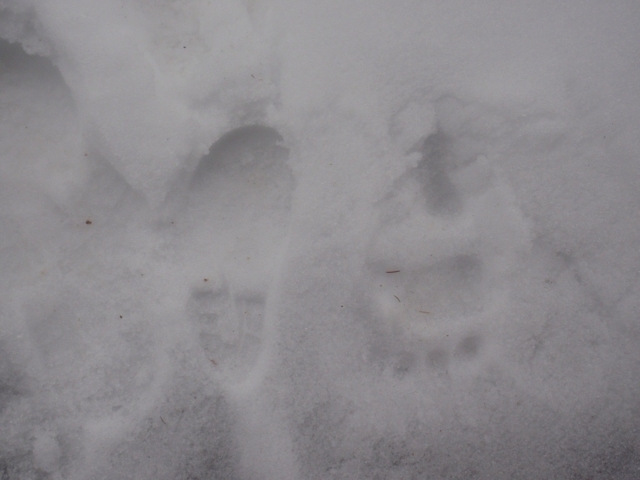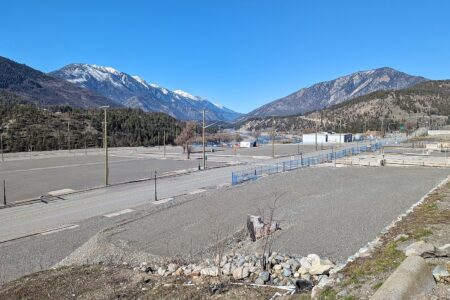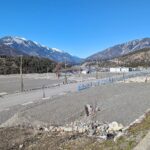The bears are back in town!
It seems apt that Rossland’s first bear of the spring should descend from Deer Park, cruise Black Bear Drive…and saunter right through the backyard of Bear Aware coordinator Sharon Wieder.
“There were quite big footprints in the snow around my house yesterday morning,” Weider said on Tuesday at her home near the Lion’s Campground. “It meandered all around my house and checked out my compost pile. Then it went to the top of a big pile of snow we shovel off our upper deck, down the other side of the pile and off to the carport where it decided to check out the end of the kayak, to see if there was anything good going on.”
There wasn’t anything of interest to this bear, either in the compost or in the carport, but Wieder said the time has come for Rossland to batten down the hatches: garbage comes in, bird feeders go down, and electric fences turn on.
Wieder also had reports on Tuesday of three bears in Trail, “most likely a mom and her two cubs,” she said.
This time of year is critical in the human-bear relationship, Wieder explained.
“The trick is to make sure there’s nothing here for the bears to hang around for. If they can’t get into dumpsters, there’s no garbage out, and no bird feeders, they’re going to go away. But if people wait until they pull someone’s car apart or rip into a freezer, at that point the bear’s already got into enough trouble that it’s probably going to be destroyed.”
To that end, Wieder hopes residents will report bear sightings (and garbage sightings) to Bear Aware or RAPP—Report All Poachers and Polluters: 1-877-952-7277.
RAPP tracks statistics of sightings and helps conservation officers (COs) and others, like Wieder, to engage in proactive education. She said people need not be concerned that a CO will turn up to kill the bear unless the bear is known to be a problem—causing property damage or threatening someone. The statistics on the bears’ movements, however, can be invaluable.
“The reality is, the sooner we know where the bears are and what they’re doing, the easier it is for us to get the message out,” she said. “Not everyone’s aware. It helps us get people to pay attention and to do the things they’re supposed to do, to report things like people leaving out garbage when they shouldn’t. That’s what helps the bears the most.”
Wieder emphasized that compost shouldn’t be a problem. “The bear dug around a little bit,” she said about her compost, which she has used all winter, “but there’s nothing much in there. It’s mostly frozen, gnarly, or broken down.”
There’s no way around taking bird feeders down, unfortunately. “Bears are really resourceful and they really love sunflower seeds,” Wieder said. “This time of year, I throw handfuls of seeds on the snow if birds are around, and the birds clean it up right away.”
The same day the bear tromped through her yard, Wieder went up to a workshop in Nelson on the “West Kootenay Bear Conflict Working Group.” It was led by a new conservation officer and attended by “anyone dealing with bears at any level,” Wieder explained, from representatives for Bear Aware, the Nelson police, the RCMP, and municipal employees, to bear biologists and conservation officers.
“It was a round table discussion to look at bears and find out what communities can do, and which different groups can work together,” she said. “We’re going to try to have these meetings on a regular basis.”
New Denver, in particular, sent municipal employees to this meeting because their town killed 11 bears last year, which “upset a lot of people,” Wieder said.
When questioned about the term “conflict” in the working group’s title, especially after a century in which not a single person in our region has suffered harm at the paws of a bear, Wieder laughed and agreed she would prefer another term.
“No, they’re not violent physically against people, but ‘conflict’ has a long history of use by COs and biologists,” Wieder said. She added, “Not all the people and all the bears are on the same page. Not everyone is happy with having bears go through the backyard, ripping up the shed, breaking down apple trees…”
Wieder laughed again and recalled that the “worst thing she’d heard,” was an incident in 2010 near Red Mountain where a woman sprained her ankle running away from a bear.
“A woman was walking her dog and let the dog go off leash. It ran off and ran into a bear—a mom with cubs. The bear got annoyed, chased the dog, and the dog ran back to the owner! The woman saw her dog and this bear coming down the trail, and she decided she wasn’t going to stick around to find out what happened next.”
If you see a bear or poorly disposed garbage, help add to the database of sightings by calling Sharon Wieder of Bear Aware (250-231-2751) or RAPP (Report All Poachers and Polluters: 1-877-952-7277).

























